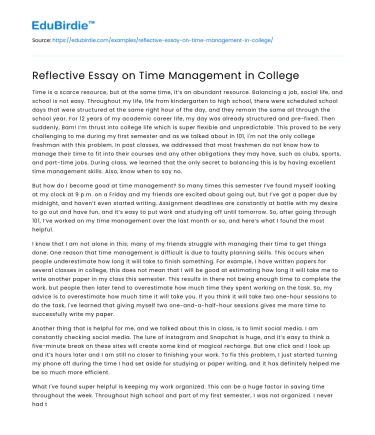Time is a scarce resource, but at the same time, it’s an abundant resource. Balancing a job, social life, and school is not easy. Throughout my life, life from kindergarten to high school, there were scheduled school days that were structured at the same right hour of the day, and they remain the same all through the school year. For 12 years of my academic career life, my day was already structured and pre-fixed. Then suddenly, Bam! I’m thrust into college life which is super flexible and unpredictable. This proved to be very challenging to me during my first semester and as we talked about in 101, I'm not the only college freshman with this problem. In past classes, we addressed that most freshmen do not know how to manage their time to fit into their courses and any other obligations they may have, such as clubs, sports, and part-time jobs. During class, we learned that the only secret to balancing this is by having excellent time management skills. Also, know when to say no.
But how do I become good at time management? So many times this semester I’ve found myself looking at my clock at 9 p.m. on a Friday and my friends are excited about going out, but I’ve got a paper due by midnight, and haven’t even started writing. Assignment deadlines are constantly at battle with my desire to go out and have fun, and it’s easy to put work and studying off until tomorrow. So, after going through 101, I’ve worked on my time management over the last month or so, and here’s what I found the most helpful.
Save your time!
We can take care of your essay
- Proper editing and formatting
- Free revision, title page, and bibliography
- Flexible prices and money-back guarantee
I know that I am not alone in this; many of my friends struggle with managing their time to get things done. One reason that time management is difficult is due to faulty planning skills. This occurs when people underestimate how long it will take to finish something. For example, I have written papers for several classes in college, this does not mean that I will be good at estimating how long it will take me to write another paper in my class this semester. This results in there not being enough time to complete the work, but people then later tend to overestimate how much time they spent working on the task. So, my advice is to overestimate how much time it will take you. If you think it will take two one-hour sessions to do the task, I've learned that giving myself two one-and-a-half-hour sessions gives me more time to successfully write my paper.
Another thing that is helpful for me, and we talked about this in class, is to limit social media. I am constantly checking social media. The lure of Instagram and Snapchat is huge, and it’s easy to think a five-minute break on these sites will create some kind of magical recharge. But one click and I look up and it’s hours later and I am still no closer to finishing your work. To fix this problem, I just started turning my phone off during the time I had set aside for studying or paper writing, and it has definitely helped me be so much more efficient.
What I've found super helpful is keeping my work organized. This can be a huge factor in saving time throughout the week. Throughout high school and part of my first semester, I was not organized. I never had to be. In high school, I could be sloppy and still graduate with a 4.0, but in college, it’s an entirely different story. I decided to buy separate binders, notebooks, and folders for each class. After that, I was quickly able to find the sheets of notes I needed for the upcoming test instead of scrambling through my backpack for them.
Time management is difficult. But as long as you sit down and create a study plan, you’ll be just fine. That’s exactly what I did in 101. As a class, we sat down and planned out our entire weekly study schedule down to the minute. Ever since then things have gone so much more smoothly than before. The act of actively putting things that are important to us on the calendar makes us happier and, as I said before, more organized. We all have a ton of things we can be doing every day and a ton of things we have to do every day. The key is to focus on the top three or four things that are most important and do them one by one at a certain time you set aside for that task. Just take it one at a time. Creating a schedule and being motivated to crush it is probably the best advice I got from being in 101. I know it seems like creating a schedule wouldn’t be such a radical, idea but when you think about it, in college, you have so much free time, you feel like you don’t really need a schedule. Newsflash, you do.
The last point I want to make about time management is that it’s all about balance. Balance and moderation between work and play, relaxation, and study time. That is the most important thing you can incorporate into your lifestyle. Luckily, through 101, I was able to tackle these issues and practice the methods, ideas, and techniques I learned in class.






 Stuck on your essay?
Stuck on your essay?

